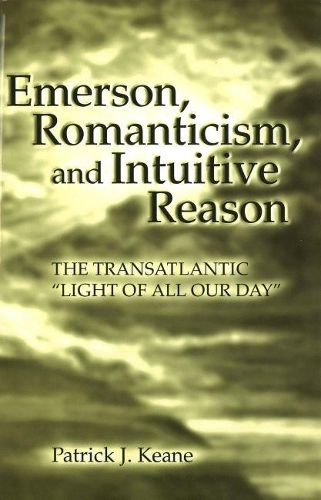Readings Newsletter
Become a Readings Member to make your shopping experience even easier.
Sign in or sign up for free!
You’re not far away from qualifying for FREE standard shipping within Australia
You’ve qualified for FREE standard shipping within Australia
The cart is loading…






Emerson, Romanticism, and Intuitive Reason is a comparative study in transatlantic Romanticism, focusing on Emerson’s part in the American dialogue with British Romanticism and, as filtered through Coleridge, German Idealist philosophy. The book’s guiding theme is the concept of intuitive Reason, which Emerson derived from Coleridge’s distinction between Understanding and Reason and which Emerson associated with that
light of all our day
in his favorite stanza of Wordsworth’s
Ode: Intimations of Immortality.
Intuitive Reason became the intellectual and emotional foundation of American Transcendentalism. That light radiated to illuminate Emerson’s life and work, as well as the complex and often covert relationship of a writer who, however fiercely
self-reliant
and
original,
was deeply indebted to his transatlantic precursors. The debt is intellectual and personal. Emerson’s supposed indifference to, or triumph over, repeated familial tragedy is often attributed to his Idealism - a complacent optimism that blinded him to any vision of the tragic. His
art of losing
may be better understood as a tribute to the
healing power,
the consolation in distress, which Emerson considered Wordsworth’s principal value. The second part of this book traces Emerson’s struggle - with the help of the
benignant influence
shed by that
light of all our day
- to confront and overcome personal tragedy, to attain the equilibrium epitomized in Wordsworth’s
Elegiac Stanzas :
Not without hope we suffer and we mourn.
$9.00 standard shipping within Australia
FREE standard shipping within Australia for orders over $100.00
Express & International shipping calculated at checkout
Emerson, Romanticism, and Intuitive Reason is a comparative study in transatlantic Romanticism, focusing on Emerson’s part in the American dialogue with British Romanticism and, as filtered through Coleridge, German Idealist philosophy. The book’s guiding theme is the concept of intuitive Reason, which Emerson derived from Coleridge’s distinction between Understanding and Reason and which Emerson associated with that
light of all our day
in his favorite stanza of Wordsworth’s
Ode: Intimations of Immortality.
Intuitive Reason became the intellectual and emotional foundation of American Transcendentalism. That light radiated to illuminate Emerson’s life and work, as well as the complex and often covert relationship of a writer who, however fiercely
self-reliant
and
original,
was deeply indebted to his transatlantic precursors. The debt is intellectual and personal. Emerson’s supposed indifference to, or triumph over, repeated familial tragedy is often attributed to his Idealism - a complacent optimism that blinded him to any vision of the tragic. His
art of losing
may be better understood as a tribute to the
healing power,
the consolation in distress, which Emerson considered Wordsworth’s principal value. The second part of this book traces Emerson’s struggle - with the help of the
benignant influence
shed by that
light of all our day
- to confront and overcome personal tragedy, to attain the equilibrium epitomized in Wordsworth’s
Elegiac Stanzas :
Not without hope we suffer and we mourn.